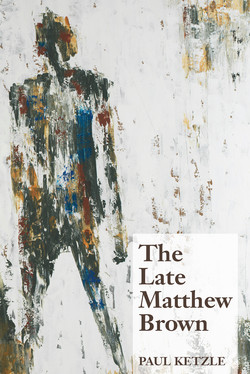Читать книгу The Late Matthew Brown - Paul Ketzle - Страница 8
На сайте Литреса книга снята с продажи.
ОглавлениеIn Media Res
Across the pool deck, my daughter lies stretched out on a towel far from the water’s edge, head bobbing to earphones that barely contain the noise, pretending to idly thumb the pages of a magazine while she watches the swarming masses around her through the corners of her yellow sunglasses. Unmistakably, unapologetically twelve.
All around us along the patio, the lives of other families overflow. Children scurry between the worn, scattered lawn chairs and sunning elderly men whose dimpled heads shine, bright and blinding. Young and hyper and semi-medicated, the kids shriek as they play, the pitch of fright and uncontainable joy, tossing themselves hurly-burly into the shallows. The air resonates with the call and echo: Marco. Polo. Marco. Polo. Rascals dodge and duck, burn toes on the concrete, deftly slide across pale blue tile. They ignore the posted signs and bored warnings from lifeguards. They pierce the water’s surface, human cannonballs and arrows, so slick and deadly. The only survivors are the balanced and the silent.
These are the fleets of summer, reliable and trying as the season. I watch them, water level, reclined and adrift upon my inner tube, seared by the heat. From this position, I can take all this in: Thin boys balanced on each other’s shoulders, grasping and clawing and falling all over themselves—Damp, whirled towels snapping at exposed skin—Girls huddling by the shallow steps and across patio chairs, coconut oil making their earth-toned flesh glisten—An elderly woman tipping an equally elderly man toward the water beside the diving board, a look on her face suggesting long-overdue payback for some distant indiscretion; and as he falls, he reaches out and catches her arm, her desperate shriek cut short as she plunges under the surface.
The screams, the laughs, the bright chirp of conversation.
My daughter flips through the pages of Smithsonian, lingering on the glossy text of articles, the dark, elegant photographs. For a moment I feel she might glance over at me, but she does not look up. So I drift, waiting, harboring a hope for some kind of acknowledgment. When she lifts a hand, I instinctively raise mine in a responding wave, though she only scratches her neck, then casually turns another page.
Into my carefully managed life of solitude she has abruptly appeared, full-blown and nearly adult, full of what my folks had called moxie and a wealth of attitude to spare, not to mention those unpredictable hand gestures that just leave me hanging. And in just these few weeks, she’s led me to my ruin, driven me to my death.
Less than a year ago, we each had no idea of the other. We did not know that we even existed.
